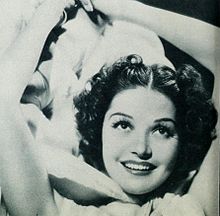Loading AI tools
American actress From Wikipedia, the free encyclopedia
Marjorie Weaver (March 2, 1913 – October 1, 1994) was an American film actress of the 1930s through the early 1950s.
Marjorie Weaver | |
|---|---|
 Weaver as she was pictured in Photoplay magazine's August 1938 issue. | |
| Born | March 2, 1913 Crossville, Tennessee, U.S. |
| Died | October 1, 1994 (aged 81) Austin, Texas, U.S. |
| Nationality | American |
| Alma mater | University of Kentucky Indiana University |
| Occupation | Film actress |
| Years active | 1934–1952 |
| Known for | |
Weaver was born in Crossville, Tennessee to John Thomas Weaver and his wife, Ellen (née Martin). Her father was a general freight agent for a railroad in Louisville, Kentucky.[1] She attended the University of Kentucky, and later the Indiana University,[2] with interests in music and won beauty contests at both schools.[1]
Weaver began her acting career as a stage actress in the early 1930s, and also worked as a model during that period, as well as a singer. She received her first film role, uncredited, in 1934. From 1936 through 1945 she received steady acting roles. She began receiving credited roles in larger productions, and starred opposite Ricardo Cortez in the 1937 film The Californian, and that same year she starred opposite Tyrone Power in Second Honeymoon.

From 1938 through 1945 she had twenty seven starring roles in films, some of which were B movies. The most notable film role was playing Mary Todd Lincoln in Young Mr. Lincoln (1939), which also starred Henry Fonda and Alice Brady. Some of her more recognizable roles from that seven-year period included a role in the Michael Shayne mystery series opposite Lloyd Nolan, and her role in Charlie Chan's Murder Cruise. In 1945, she starred opposite Robert Lowery in Fashion Model, which was her last role of any consequence. She had four minor roles in 1952, after which she retired from acting.
On October 22, 1937, in Goshen, Indiana, she married naval officer Kenneth George Schacht.[3] She divorced him in 1941, after having seen each other only 16 days over their four-year marriage.[4] Schacht had been captured by the Japanese, and the Navy had notified her that he was dead.[5]
Seamless Wikipedia browsing. On steroids.
Every time you click a link to Wikipedia, Wiktionary or Wikiquote in your browser's search results, it will show the modern Wikiwand interface.
Wikiwand extension is a five stars, simple, with minimum permission required to keep your browsing private, safe and transparent.